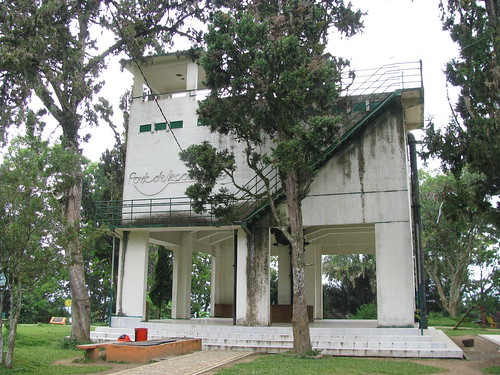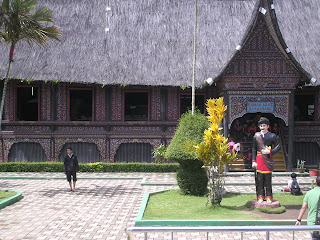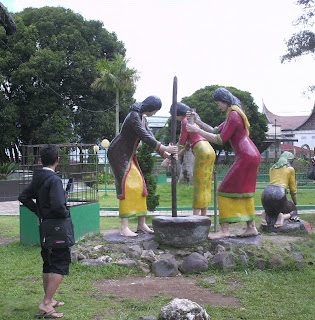Have you ever visit my beautifull hometown, Bukittinggi? Now let’s see….
Bukittinggi City is one of Level II Area in west Sumatera Province, Indonesia with Bukittinggi as capital. Geographically, it is located between 0o172 8.933 South Latitude and 100o222 3.613 East Longitude. It is bordered to Agam Regency in the east, west, north and south. Bukittinggi City area is 25.24 Km2 that is divided into 3 subdsitricts.
The beauty of the city becomes attraction for tourist. Shoipping centre is really easy to find. This regency is called "Jam Gadang" City. Jam Gadang means big clock, that becomes icon of Bukittinggi Regency. From Jam Gadang, tourism activity and shopping can be started because the historical place such as Bung Hatta House, Fort de Kock, and Japan Hole are located near Jam Gadang. This city also has supporting structure and infrastructure that satisfy such as 60 hotels, and 15 travel agencies
Bukittinggi is also known as trading and services city. The excistance of Atas Market, Bawah Market, and Simpang Aur Market, or Aur Kuning Market is really known. Atas Market is one of economic place. Aur kuning Market is not the same as another market that sells retail goods, it sells goods in bulk or wholesale. People called Aur Kuning market as Tanah Abang Market at Bukittinggi just like Tanah Abang Market, Jakarta. is the largest with building occupies 12,872 square meters. Inside there are 1340 units of shops and plots los 3557 units which are all fully charged.
In crafts centre, Bukittingi becomes embroidery crafts centre, that adorns various model of kebaya and mukena. The original embroidery of Bukittinggi usually uses direct Kerancang technique that is complicated an takes long time.
Bukittinggi City is suitable as education city. The education of Bukittinggi is relatively advanced compared with other areas in West Sumatera. In 1957, there was Medicine Faculty in Universitas Andalas Padang in Bukittinggi, and also FKIP IKIP Padang (now called Universitas Negeri Padang), APDN, King School, and SMU 1 & SMU 2, the oldest school that delivered many world-caliber leaders.
The beauty of the city becomes attraction for tourist. Shoipping centre is really easy to find. This regency is called "Jam Gadang" City. Jam Gadang means big clock, that becomes icon of Bukittinggi Regency. From Jam Gadang, tourism activity and shopping can be started because the historical place such as Bung Hatta House, Fort de Kock, and Japan Hole are located near Jam Gadang. This city also has supporting structure and infrastructure that satisfy such as 60 hotels, and 15 travel agencies
Bukittinggi is also known as trading and services city. The excistance of Atas Market, Bawah Market, and Simpang Aur Market, or Aur Kuning Market is really known. Atas Market is one of economic place. Aur kuning Market is not the same as another market that sells retail goods, it sells goods in bulk or wholesale. People called Aur Kuning market as Tanah Abang Market at Bukittinggi just like Tanah Abang Market, Jakarta. is the largest with building occupies 12,872 square meters. Inside there are 1340 units of shops and plots los 3557 units which are all fully charged.
In crafts centre, Bukittingi becomes embroidery crafts centre, that adorns various model of kebaya and mukena. The original embroidery of Bukittinggi usually uses direct Kerancang technique that is complicated an takes long time.
Bukittinggi City is suitable as education city. The education of Bukittinggi is relatively advanced compared with other areas in West Sumatera. In 1957, there was Medicine Faculty in Universitas Andalas Padang in Bukittinggi, and also FKIP IKIP Padang (now called Universitas Negeri Padang), APDN, King School, and SMU 1 & SMU 2, the oldest school that delivered many world-caliber leaders.
Now, let’s have a trip to the many tour object of Bukittinggi.
JAM GADANG
Jam Gadang (“Jam” mean Clock, and “Gadang” mean “Massive” in the Minangkabau language) is a clock tower situated in the heart of Bukittinggi, West Sumatra, Indonesia. How phenomenal of Jam Gadang for domestic and foreign tourists, making it is as a landmark of Bukittinggi and also be one of West Sumatra icons.
Jam Gadang was built in 1926 by architects Yazid Sutan Dental Ameh. This clock was a gift from the Dutch Queen to Rook Maker- the Bukittinggi Controleur. Jam Gadang built without iron supports and mortar, but with a mixture of lime, egg whites, and white sand. The clock’s diameter is 80 centimeters, the base’s dimension is 13 metres in length and 4 meters wide, and it stands 26 meters tall.
The clocktower has undergone several changes in the form at the top. During the Dutch colonial period, the heyday of Jam Gadang installed with rooster statue. However, when the Dutch were defeated and change by Japanese colonialists, the top replaced with pagoda. Furthermore when Indonesian independence period, the top of Jam Gadang replaced with traditional Bagonjong roof – Minangkabau traditional house.
Construction of Jam Gadang spend cost of 3,000 Guilder. One unique feature of Jam Gadang is that it uses the “IIII” for the number 4 instead of its traditional Roman Number “IV”.
Nestled in the highlands north of Padang in the Agam valley, the town of Bukittinggi or ‘high hill’ is West Sumatra’s cultural center. While Padang may be the modern commercial and administrative hub, Bukittinggi is a bustling market town.
Although it is less than a degree south of the equator, Bukittinggi has a refreshingly cool climate due to its elevation – over 900 meters above sea level. While it rains here often, this is not enough to deter travelers who come to enjoy what many claim is the most hospitable city in Sumatra.
This town also has an alternative name, Tri Arga, which refers to the three majestic mountains that shape the regions fortunes.
Many visitors come to Bukittinggi to visit the remarkable Ngarai Sianok Canyon where giant rock cliff faces, rugged trees which grow on top and the dramatic surrounding mountains make this canyon a spellbinding view.
This is an ideal place to go if you want to get beyond the average tourist trail. Compared to other spots in Sumatra, Bukkitinggi only receives a handful of visitors that use the town as a base for nearby hikes or to take cultural tours to the Minangkabau highland. Taman Marga Satwa dan Budaya Kinantan
Taman Marga Satwa dan Budaya Kinantan or better known as Kinantan Zoo is located in Taman Bundo Kanduang. This area was built in 1900 by a Dutch named Controleur Strom Van Govent. This wildlife park built on a hill called Bukit Malambuang.
At the start of construction, the park was not yet have a collection of animals. New in 1929 made the zoo to include several collections of animals into the park. In 1929 the zoo made by Dr J Hock and is the oldest zoo inIndonesia and the only one in West Sumatra .
Thanks to a very serious management by the Dutch colonial government, Bukittinggi Zoo continues to grow and achieve heyday in 1933. This year, farm animals Bukittinggi able to provide about 150 animals typical of theisland of Sumatra Eastern Indonesia .
In 1935, in Bukittinggi Zoo built traditional house. Rumah gadang bergonjong' has 9 rooms and platforms on the right and left. On the walls of traditional houses have carvings that reflect the height of the realm of Minang culture. To reach this location, tourists can use a landline. From the city ofPadang
The zoo was originally named Kebun Bungo after it changes the name of a Taman Puti Bungsu. In 1995 through local regulation No. 2 of 1995 again changed the name of a Taman Puti Bungsu at Taman Marga Satwa dan Budaya Kinantan, along with his official fortress:
1. Fort De Kock
At the start of construction, the park was not yet have a collection of animals. New in 1929 made the zoo to include several collections of animals into the park. In 1929 the zoo made by Dr J Hock and is the oldest zoo in
Thanks to a very serious management by the Dutch colonial government, Bukittinggi Zoo continues to grow and achieve heyday in 1933. This year, farm animals Bukittinggi able to provide about 150 animals typical of the
In 1935, in Bukittinggi Zoo built traditional house. Rumah gadang bergonjong' has 9 rooms and platforms on the right and left. On the walls of traditional houses have carvings that reflect the height of the realm of Minang culture. To reach this location, tourists can use a landline. From the city of
The zoo was originally named Kebun Bungo after it changes the name of a Taman Puti Bungsu. In 1995 through local regulation No. 2 of 1995 again changed the name of a Taman Puti Bungsu at Taman Marga Satwa dan Budaya Kinantan, along with his official fortress:
1. Fort De Kock
2. Limpapeh Bridge
4. Fish Aquarium
In the area of the zoo was built is also a place used to perform various types of traditional art performances Minangkabau. There are also Rumah Adat Tradisional functioned as a museum displaying the objects of culture and history, like the Minang traditional clothes and jewelry.
No less interesting is the presence in the region Limpapeh Bridge Zoo Bukittinggi. This bridge connects Bukittinggi Zoo with Fort Fort De Kock located in Bukit Jirek.
Now, Bukittinggi Zoo is known as the Taman Marga Satwa dan Budaya Kinantan. A wildlife park which has undergone various changes, reaching a peak of glory, then recede in appalling condition.
The long journey of this wildlife park could not help make it as a precious heritage for all the children of this nation. Therefore, to maintain its existence in order to remain sustainable is the glorious duty of every child slung over the shoulders of this country.
Now, Bukittinggi Zoo is known as the Taman Marga Satwa dan Budaya Kinantan. A wildlife park which has undergone various changes, reaching a peak of glory, then recede in appalling condition.
The long journey of this wildlife park could not help make it as a precious heritage for all the children of this nation. Therefore, to maintain its existence in order to remain sustainable is the glorious duty of every child slung over the shoulders of this country.
This is a little view in Taman Margasatwa Budaya Kinantan:
The beautiful Sianok Canyon Sianok Canyon is one of the most impressive sites in West Sumatra , is very very amazing, particularly during sunrise and sunset, and can be best viewed from the Panorama park Bukittinggi or you could also go into the gorge, which is a settlement and paddy field area. In addition to the gorges beauty, visitors can also visit a Japanese bunker (the Japanese bunker is a massive excavation used by the Japanese to hide troops and munitions during WW II) located at the base of the gorge.
Ngarai Sianok has abundant natural resources and culture. It is located about 1 km southwest of Bukittinggi, where the distances are between Jam Gadang ( Big Clock ) and Pasar Atas. Ngarai Sianok just a few blocks from one of hotel in Bukittinggi. The tourists are able to reach it by vehicles or walk on foot while heat the Bukittinggi fresh air. Visitors also can take a private car or sado/andong (traditional carriage) from the city center to Panorama Park Panorama Street
From Minangkabau international airport, you can take a rented car or minibus plying the Padang-Bukit Tinggi route to Bukit Tinggi. The distance betweenPadang
From Minangkabau international airport, you can take a rented car or minibus plying the Padang-Bukit Tinggi route to Bukit Tinggi. The distance between
If you want to enjoy the beauty of Ngarai Sianok from
Panorama
There is delightful walk down into the canyon and along the river. This trail goes all the way to Koto Gadang, the home of the Silversmith of WestSumatra. You can hike through the Sianok canyon River, is able to to cross by a canoe that facilitated by Qurays Water Sport Organization at this time.the routes that will be gone trough are from Lambah Village until Sitangkai Batang Palupuh Village along 3.5 hours. On its bank, there are founded are all kinds of plants such as Rafflesia and medicine plants. The wild animals founded like long tile monkey, gibbon, deer, wild boar, panther and tapir. In Dutch Colonial, the chasm also called “Kerbau Sanget, because there are much wild buffalo that lived in free around the river. Woods and grasses on its top plant it.
To Do
In Panorama Park Sianok Canyon
InPanorama Park
In the North of Panorama Park, there are merchandises stall which sell t-shirts, bag, rattan handycrafts, until paintings which record the exquisite ofSianok Canyon
To Eat
Kiosks within the park only sell snacks and drinks. Outside the compound, you could find many restaurants selling Kapau rice.
Panorama Garden Panorama Park with views of the canyon Sianok the background of Mount Merapi
Just below this park there is a hole (tunnel) with lots of hallways and rooms. This hole is known asJapan Indonesia Asia . The entrance to the Hole in the Japanese Garden Panorama.
In addition to the market top, inside the park is also lined up a souvenir shop selling various handicrafts as souvenirs from the City Tourism Bukittinggi,West Sumatra .
In
In the North of Panorama Park, there are merchandises stall which sell t-shirts, bag, rattan handycrafts, until paintings which record the exquisite of
To Eat
Kiosks within the park only sell snacks and drinks. Outside the compound, you could find many restaurants selling Kapau rice.
Just below this park there is a hole (tunnel) with lots of hallways and rooms. This hole is known as
In addition to the market top, inside the park is also lined up a souvenir shop selling various handicrafts as souvenirs from the City Tourism Bukittinggi,
LOBANG JEPANG
This hole is actually more accurately described as a tunnel (bunker)
Seeing the city's hilly topography, valleys and canyons of this, the generals Watanabe ordered to build a tunnel that is more popular with the Japanese name of the hole. Development was done with human power by force (Romusha Kinsohoshi) for military needs. Initially voluntary, then turned into forced labor (Romusha).
Many workers imported from Java. Because the work must be hunted down, many workers who died at work, came into being tired and not fed. Those who disobey are beaten or shot to death inhuman.
The tunnel is made at a depth of 40-50m, below the ground hard enough bercadas tengan line 2 meters. The length of 1470 meters, is divided into 20 rooms consisting of bedroom, the room hideaway, treatment room, kitchen room, the room prison and ammunition warehouses. Making room deliberately winding with a number of indoor trap. When the survey is conducted prior to the renovation by the city of
Two of the mouth of the tunnel that is currently visible, one leading to the canyon Sianok and the other one on the cliff of the entrance to the park attractions Panorama. The function of the mouth of the tunnel other than as an entry, as well as ventilation to the outside world watching.
This Japanese hole by the City of
This artificial cave has a length of about 1.5 kilometers, but now many are closed for security reasons, leaving 750 meters. The atmosphere in the ditch japan was cool. With fluorescent lighting at some point create a mystical atmosphere in it. Perhaps the Japanese tour guide hole, there is one room that also functions as a prisoner torture chamber.
One of the atrocities the Japanese army was the killing of prisoners by way of chopped. Do not stop there, the body which had been cut into pieces were then doused with hot water and salt to make sure the body was lifeless. Mystical aura is then invited one of the national private stations to use the detention room in the cave area Bukittinggi japan guts of this to the test arena.
So, when you travel to Bukittinggi, this tourist attraction not be missed. The location was in the middle of town provides easy access for visitors. To go down the stairs as the entrance to the cave entrance was tiring Japan (128 steps). But everything will be paid off with what is presented in it. Progress architecture, cool atmosphere to the mystical aura will pay in full power have been wasted. On the plus again with beautiful gardens and panoramic canyon posted Sianok fascinating.
It's a travel experience that you'll never forget, if you visit Bukittinggi. Do you Agree with me? :)






































 Jakarta Time
Jakarta Time
2 komentar:
aden ngarati perjuangan ang mal,
2 jempol untuak ang.....
Mantap gan!
Posting Komentar